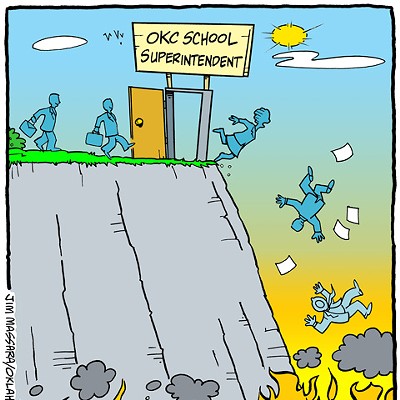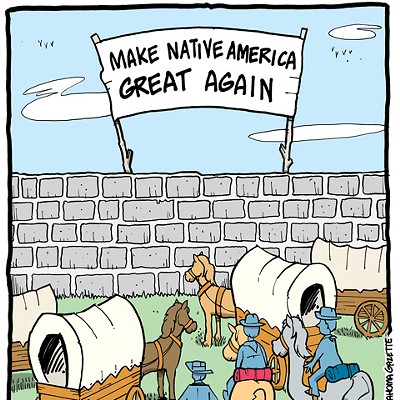As term limits officially prevent Gov. Brad Henry from running again in 2010, Republicans are now poised to seize the gubernatorial position in addition to controlling the Legislature, tightening the noose on any chance of a more-than-nominal Democratic voice in Oklahoma politics.
Traditionally, Democrats ran the show in Oklahoma. The people have elected only four Republican governors since statehood, the first in 1963. Founded by populist reformers, Oklahoma strove to serve only the interests of the people, its progressive enthusiasm standing in Democratic solidarity with the rest of the South.
In fact, according to the Oklahoma Historical Society, in 1914, more than 20 percent of Oklahomans voted for the socialist candidate in that year's gubernatorial election. Oklahoma, a collection of hard-pressed farmers and blue-collar workers, voted continuously for those whose political ideologies promised to work fearlessly for the welfare of the people and not corporate interests.
In his controversial novel "The Grapes of Wrath," John Steinbeck beautifully depicts the mood and issues important to Oklahomans in the 1930s, capturing the strong-willed, persevering, no-nonsense and hardworking character of Okies. The Democratic platform initially served their interests well.
However, the changing political landscape gave way to the rise of Republicanism in the South, with President Reagan officially sealing the deal in the 1980s by overcoming the Southern Democratic surplus. This ultimately revealed a much more competitive Republican Party in the South " including Oklahoma. The relatively recent competitiveness of the Republican Party becomes even more apparent with the 2008 presidential election, as Oklahoma voted overwhelmingly for John McCain in every single county.
Henry could very well be the last remaining remnant of gubernatorial Democrats if a Republican is elected in 2010.
But despite the crushing power of Republicans regionally, nationwide they are scrambling to reform their base, particularly after the debacle of the presidential election. McCain may have succeeded in Oklahoma, but faltered much elsewhere, particularly in some traditionally Republican states. Also, the rhetoric of local Republican politicians like Rep. Sally Kern, U.S. Sens. Jim Inhofe and Tom Coburn is not popular in the rest of the country, and many Republicans may distance themselves from that kind of ideology in the future as they try to become a more nationally viable party. Moreover, Oklahoma's electorate consists of substantially more registered Democrats than Republicans, which suggests that the level of power Republicans appear to have in Oklahoma now is nowhere near the state's ironclad Democratic power throughout the past 100 years.
That could mean hope for Democrats in Oklahoma. And as Oklahoma slowly relinquishes its hold on the brand of Republicanism that will likely die out if the party wants to regain power on a national scale, Democrats can still hope for a changing tide.
However, if Oklahoma Democrats ever want a substantial voice in Oklahoma again, their only option now is to rely on changing political trends and politicians, coupled with the hard work, perseverance and stubborn resilience that only Steinbeck can capture.
Branson, a Norman resident and 2009 University of Oklahoma English and history graduate, is attending graduate school at the University of Kansas this fall.












